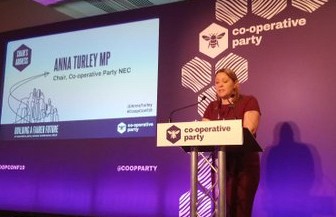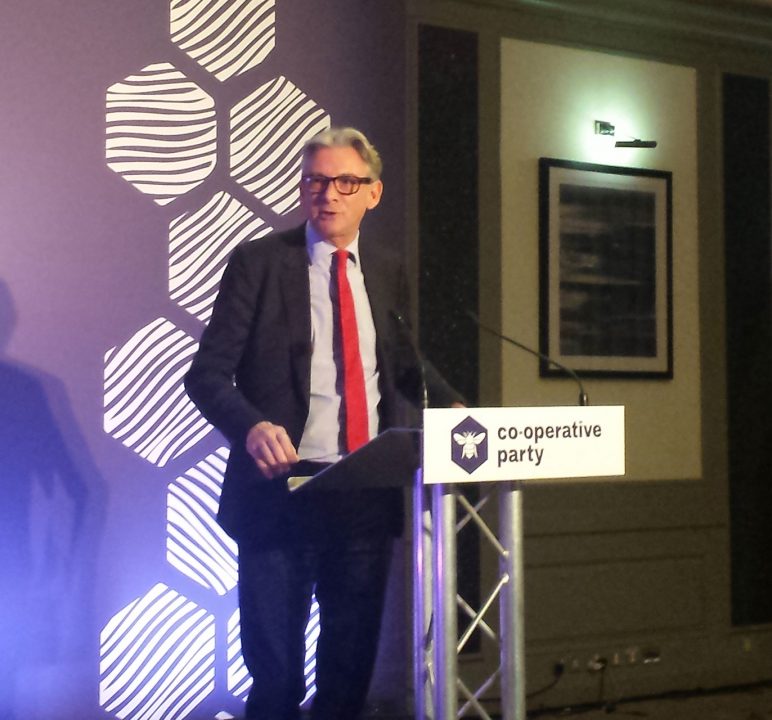The Co-op Party’s annual conference saw it set out its stall for the expected general election with a series of rallying calls for a fairer economy, radically reshaped on collaborative lines.
The conference, held in Glasgow over the weekend, was the Party’s first under its new chair, Anna Turley MP, and general secretary, Joe Fortune, who both paid tribute to the Party’s high-profile campaigns on food justice, modern slavery and crime against retail workers, and the spread of co-operative ideas through local government.
Opening the conference, Ms Turley said co-operation offered a route away from to the rising populism and polarisation affecting society, and solutions to the environmental challenges and economic inequality in the world.

And she called on the Party, which is committed to doubling the size of the UK’s co-operative economy, to be “even more radical” and aim for democratic control of the UK economy.
In his keynote speech, Richard Leonard, leader of the Scottish Labour Party, continued the theme, pledging to pursue “democratic socialism” and bringing in a Marcora-style law to support worker buyouts. He said that just as the co-op movement’s founders had a vision to right the wrongs of their day, we should “let this generation of co-operators have a vision for this century”.
In terms of the Scotland, this would mean turning the country into “the Mondragon of the north”, with a co-operation driving a green industrial revolution.
This means redistribution of power, he said – in parliament and local government and also “between tenant and landlord, citizen and state, poor countries in the south and rich countries in the north, women and men, worker and owner”.
Mr Leonard reiterated his support for measures to tackle inequality in land ownership in Scotland to help housing co-ops, and offered a vision publicly owned of services in the form of “a mosaic not a monolith”, with power coming from below, not above.

The conference also heard updates on the work of the Co-op Party at Westminster and in the Welsh and Scottish national assemblies.
Jim McMahon, Labour/Co-op MP for Oldham West and Royton, said the Party should respond to the “real sense of anger” of people in his constituency, and in similar towns, where “people are the worker bees –they are industrious, they are grafters but for whatever reason they cannot make progress”.
Related: Keir Starmer vows to stop a no-deal Brexit at Co-op Party conference
And while previous generations had the assurance that at least their children and grandchildren faced a brighter future, this is no longer the case.
“We’ve discussed very little what the new settlement can be when the social contract has been broken,” he warned, adding that this crisis had fuelled the Brexit vote and produced “a government in chaos”.
The answer is a new economy based on co-operation, he said – a call echoed by Glasgow’s Labour/Co-op MSP Johan Lamont, who also repeated criticisms of the SNP government by Richard Leonard.
“The SNP has not been effective in delivering co-op values,” she said, while the Co-op Party has made progress by putting co-operation on the agenda over issues such as public transport and modern slavery.
Huw Irranca-Davies, Labour/Co-op Welsh Assembly member for Ogmore, said the “laboratory of devolution” had allowed Wales to put co-operative values into action.
He gave the example of Transport for Wales, a not-for-profit business, as the sort of “intelligent approach to economic growth” that would encourage a co-operative economy.
To that end, the Welsh government is now trying to make the country “a fair work nation” by incorporating community wealth building into its procurement processes, added Mr Irranca-Davies. He said Lee Walters – Labour/Co-op AM and deputy minister for economy and transport – had been working with the Centre for Local Economic Strategies thinktank on ways to for Wales to adopt the Preston model.
The final keynote speaker, Christina McAnea – assistant general secretary at Unison – reaffirmed the union’s affinity with the co-op movement and discussed its role in delivering fairer terms of employment and in public services.
She gave the example of private companies operating in the care sector, and said they were extracting capital from homes the system via expensive loans. Co-operative, people-led alternatives would lead to better outcomes for workers and service users, she said.
The conference also featured policy debates, allowing delegates the chance to comment on the Party’s policy papers – Climate Change, Energy & the Environment, and Community, Place & Power, both of which were adopted by conference in a subsequent vote.
And, in a new experiment, the floor was thrown open to delegates to discuss two topical issues – mental health, with delegates sharing personal experience and calling for new approaches to tackle the problem, shared personal experiences; and modern slavery, with calls to keep the issue live, promote public understanding, and protect slavery survivors from any toughening of immigration laws.